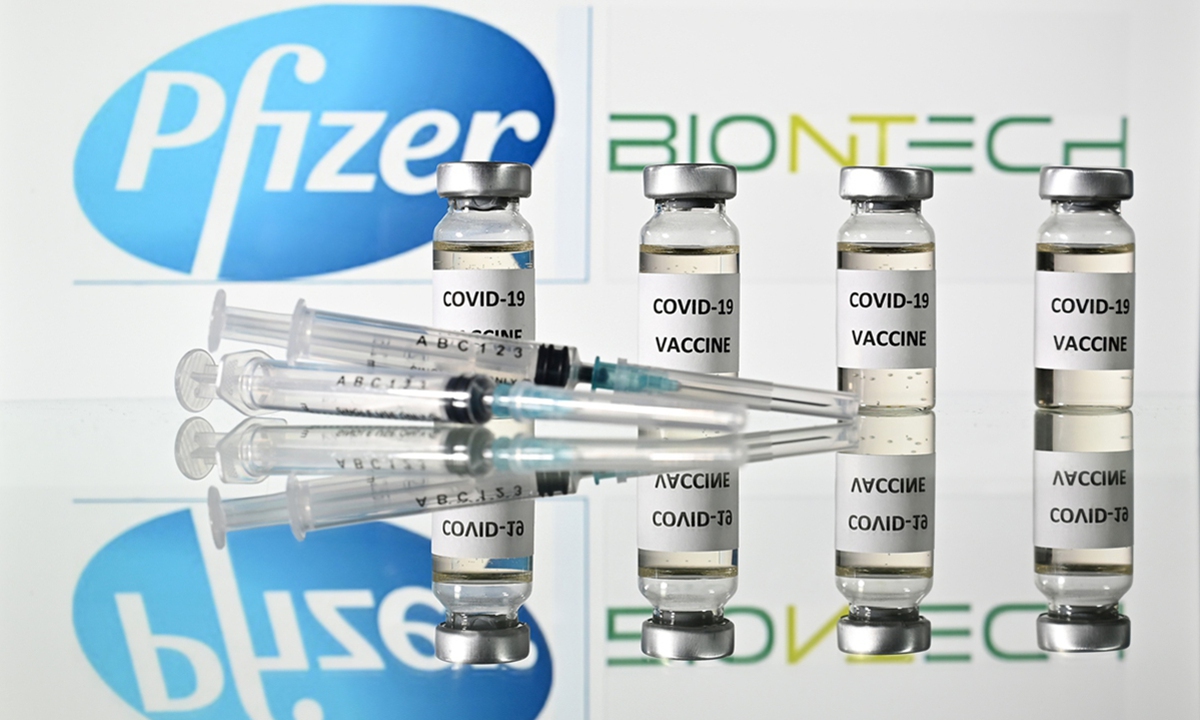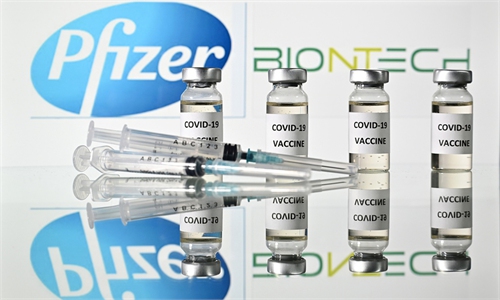
An illustration shows vials of a COVID-19 vaccine and syringes with the logos of US pharmaceutical company Pfizer and German partner BioNTech. Photo: AFP
The COVID-19 pandemic continues to rage in Europe. European countries expect the large-scale vaccinations will help them curb the disease.However, the US pharmaceutical firm Pfizer, the major provider of vaccine doses to the EU, recently announced it would slow down its deliveries to EU countries. Many leaders of EU countries have expressed their discontent toward Pfizer's delay.
According to Reuters, the Italian government on Monday sent a letter of formal notice to Pfizer calling on the drug company to respect its contractual commitments over its COVID-19 vaccine deliveries, the government special commissioner said.
Pfizer released a statement on January 15 and said shipments were being affected by changes to its manufacturing processes designed to boost production, and "this will temporarily impact shipments in late January to early February." Although Pfizer said on Monday it would return to its original schedule of deliveries for the EU this week, it remains to be seen whether it can achieve that.
"Europe invested billions to help develop the world's first Covid-19 vaccines, to create a truly global common good. And now the companies must deliver." European Commission President Ursula von der Leyen said on Tuesday during a virtual meeting of the annual World Economic Forum.
The US drugmaker's vaccine delays should be a political decision. The so-called manufacturing process changes may only be its excuse. The US has been worst-hit by the pandemic in the world, with the largest number of confirmed cases and deaths. Against this backdrop, this country has a huge demand for vaccines. The production capability of the US drug company may not keep up with its domestic demand. The US needs to meet its home demand first, then others', which is consistent with US diplomatic characteristics - pursuing "America First."
Before taking office, US President Joe Biden said his priority would be tackling the coronavirus pandemic. If it cannot be effectively handled, it would be difficult for him to gain trust and support. To make sure more Americans are vaccinated, delaying shipments to Europe becomes a natural choice. A science-based plan on beating the pandemic should ensure large-scale vaccination among Americans, but the US cannot violate the spirit of contracts, or impair the efforts of international cooperation in fighting the pandemic.
Another possible cause for the delay may be that pharmaceutical companies found some other vaccine-related problems.
No matter what the reason is, Pfizer's move violates its commitment. It is understandable that some leaders from EU countries are dissatisfied with this drug company. Even though the Biden administration said it would devote to restoring its international influence and leadership, at least in terms of production and delivery of vaccines, the US has not played a leading role yet.
The previous US administration had underlined "America First." To safeguard its interests, the US often sacrificed the interests of its allies. The EU's over-reliance on a few companies in the US and UK for vaccines could put EU in a vulnerable position. Pfizer's shipment delay means the EU will see more confirmed cases and deaths.
The US and the EU have had many spats over pivotal global issues. The EU's discontent with Pfizer's delivery on vaccines will aggravate their frictions. In this context, how can European countries have trust in US leadership and Biden's pledge to restore alliance with them? This incident clearly demonstrates the duplicity and hypocrisy of the US.
EU countries should have sought to diversify vaccine supplies. These countries need to look for more alternatives; otherwise, there would be a more severe public health crisis.
The Hungarian government said on January 14 that it has reached a deal with China's Sinopharm to buy its coronavirus vaccine. BBC reported Hungarian prime minister said the only way the country can satisfy the demand for vaccination, given the "frustratingly" slow delivery of the Pfizer-BioNTech vaccine, is by buying from Russia and China.
Hungary has set a good example for other EU countries. To reduce the risk of over-reliance on one or two particular vaccines and curb the spread of the disease, European countries need to seek alternative supplies. From the perspective of quality and the pace of delivery, China's vaccines will be a decent alternative for them.
The author is a professor at Institute of International Relations, China Foreign Affairs University. opinion@globaltimes.com.cn

